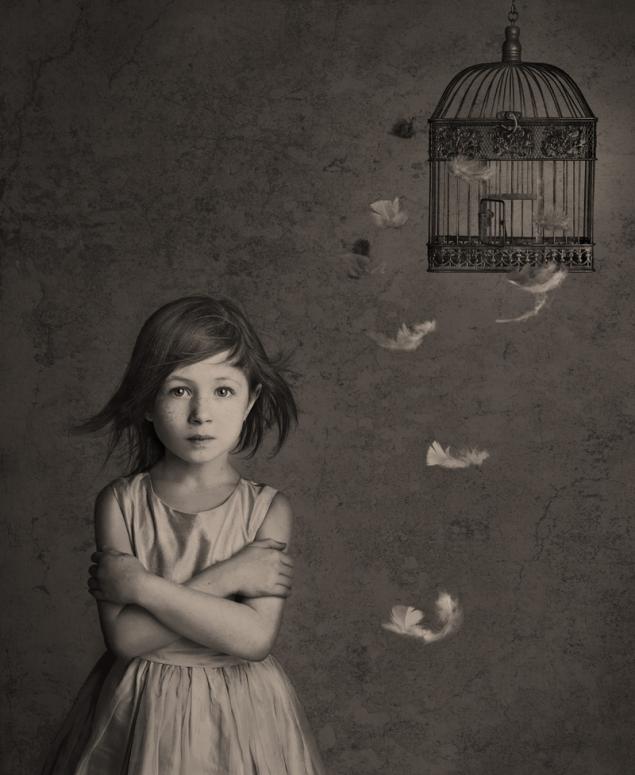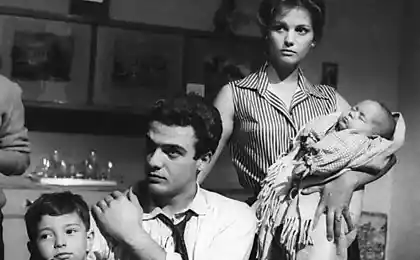740
Daughter didn't love and a heavy burden of family secrets
A mother who loves her child... One of the most taboo topics, and for both sides of this drama. Such a situation is not a secret for people of all helping professions. The mother is difficult to admit that she loves the child, it is difficult to see for one reason or another, the deficiency of the resource and ask for help, and the daughter who survived the experience of childhood in such a family, it is difficult to see the undistorted dislike reality.
This article is about the importance of having the right to speak about such trauma is not in order to accuse someone, just for the sake of pain does not inside remains toxic silence, in order to have the right to say "no, that is not with me is not all right, I just went through a very difficult experience". And especially hard to talk about it when, for other, the family seemed completely normal, if not perfect, and when "dislike" is not about starving the child and beating.

©Lisa Visser
"When I tell people about my childhood, and they reply that I have nothing to complain about, I always say: if only you could see through an impenetrable wall of family..."
Two things that I have to constantly hear from readers when I write about toxic mothers. The first — "I thought I was the only one" and these words all alone, unloved child. The second – "I never tell anyone about not talking, because I was afraid nobody would believe me and even if they did, will think it's my fault".
The rule of silence, as I call it, is part of the problem of unloved daughters, because the discussion of maternal behavior taboo. The irony is that these mothers – do they have narcissistic traits, are the overcontrol, emotionally unavailable, or increased conflict – really care about what other people think.
Emotional confusion and pain daughter's increase including thedifferencethat can be observed between the way the mother treats her daughter on the people and how when they are alone.
The reality is that most of these mothers seem wonderful to others. Even if they are not rich, these mothers may be the image of the perfect hostess, whose children are clothed and fed. Often, they participate in various local meetings, charity initiatives,public image is important to them.
"My mother all through my childhood I devalued my success in school, saying that well, at least something I can do, and in fact I'm so ugly and fat. She made me feel awful every day. Imagine my surprise when I found out after becoming an adult that she bragged about my accomplishments to others, because it made her a successful mother in the eyes of others. That was the last straw. Just classic hypocrisy."
Hiding from direct viewSometimes distant relatives aware of what is happening in the family, but it is served to them with sauce, our daughter is such a "difficult" child, "naughty", "too sensitive" or "it needs to be keep under", "she needs rigor" — this is justified by the specific attitude to the child, otherwise the people would have had questions.
But most often the true state of Affairs, this secret stays within the family. When all the distant relatives and friends gather together, such gatherings are organized by the mother in order to maintain her image of a loving, caring and family women.
Sometimes fathers participate in this negative relation to mother to daughter directly, but most often not. They can close eye on the behavior of the wife or accept her explanation, because they believe in their idea, "I know how to raise children, it's a female thing". In some families the father finds a way to support her daughter, even if not openly:
"My father did not want to directly interfere with the mother and becomes a target for her aggression. But he demonstrated his love and support discreetly and not so openly, as I would like, but nevertheless I felt his protection. This significantly helped. It abolished the pain, which caused me the attitude of the mother, but the truth was easy."
In other families, the "secret" known sister or brother, who compete with each other to the passion for the love of the mother and her locationE. Controlling and conflictual mother, as well as a mother with narcissistic traits, given such support "a La carte", all attention was where it, in its opinion, ought to be: on her.

©Lisa Visser
Covert struggle and gaslightingfamily secrets submerge the daughter, and so it does not feel appropriate in isolation. Not surprisingly, a huge question that haunts these children is very simple: if the people who are supposed to love me don't love me, then who in the world will love?
This question, as a rule, drowning out the applause that could be heard in the address of the unloved daughter from the outside world – nothing can raise self-esteem, no new friends, no school, no talent in anything.
The ratio of mother to daughter continues to distort the sense of I daughter, drop by drop, drop by drop, the endless drop of doubt. In fact, any hidden struggle – including gaslighting – the consequences of the most devastating, because of obvious conflict.
"When I grew up and tried to talk with her mother about what she told me and what I was doing, she just denied that it ever happened. She directly accused me of just turning everything on its head. She called me crazy and said that my brother called me "crazy Jenny." I know that I was right, but still on some level could not believe in myself and my inner struggle still continues. I never can trust your perception of things, you know".
Why is it so difficult to break the silenceit is Hard to overestimate the complexity of the emotional ties unloved daughters with their mothers. They still want their mother loved them, even when they see that the mother simply does not have this love. They feel unloved and alone, but fear that if about this issue, to speak openly, it will bring MORE shame and sense of isolation. And most of all they worried that no one will believe them.
Researchers estimate that about 40% – 50% of children do not get the satisfaction of their emotional needs in childhood and have an insecure attachment style. Family secrets complicate the lives of these children, and now adults – it is difficult for them to feel that they are heard and supported.
And if you are lucky you had a loving mother or a loving family, and maybe not "perfect" childhood, but still one that helped you the confidence to stand up, I beg you to remember these numbers and to understand that it was not all. published
©Peg Streep, translation Yulia Lapina
Source: www.facebook.com/psychology.lapina/posts/1871191863109059
This article is about the importance of having the right to speak about such trauma is not in order to accuse someone, just for the sake of pain does not inside remains toxic silence, in order to have the right to say "no, that is not with me is not all right, I just went through a very difficult experience". And especially hard to talk about it when, for other, the family seemed completely normal, if not perfect, and when "dislike" is not about starving the child and beating.

©Lisa Visser
"When I tell people about my childhood, and they reply that I have nothing to complain about, I always say: if only you could see through an impenetrable wall of family..."
Two things that I have to constantly hear from readers when I write about toxic mothers. The first — "I thought I was the only one" and these words all alone, unloved child. The second – "I never tell anyone about not talking, because I was afraid nobody would believe me and even if they did, will think it's my fault".
The rule of silence, as I call it, is part of the problem of unloved daughters, because the discussion of maternal behavior taboo. The irony is that these mothers – do they have narcissistic traits, are the overcontrol, emotionally unavailable, or increased conflict – really care about what other people think.
Emotional confusion and pain daughter's increase including thedifferencethat can be observed between the way the mother treats her daughter on the people and how when they are alone.
The reality is that most of these mothers seem wonderful to others. Even if they are not rich, these mothers may be the image of the perfect hostess, whose children are clothed and fed. Often, they participate in various local meetings, charity initiatives,public image is important to them.
"My mother all through my childhood I devalued my success in school, saying that well, at least something I can do, and in fact I'm so ugly and fat. She made me feel awful every day. Imagine my surprise when I found out after becoming an adult that she bragged about my accomplishments to others, because it made her a successful mother in the eyes of others. That was the last straw. Just classic hypocrisy."
Hiding from direct viewSometimes distant relatives aware of what is happening in the family, but it is served to them with sauce, our daughter is such a "difficult" child, "naughty", "too sensitive" or "it needs to be keep under", "she needs rigor" — this is justified by the specific attitude to the child, otherwise the people would have had questions.
But most often the true state of Affairs, this secret stays within the family. When all the distant relatives and friends gather together, such gatherings are organized by the mother in order to maintain her image of a loving, caring and family women.
Sometimes fathers participate in this negative relation to mother to daughter directly, but most often not. They can close eye on the behavior of the wife or accept her explanation, because they believe in their idea, "I know how to raise children, it's a female thing". In some families the father finds a way to support her daughter, even if not openly:
"My father did not want to directly interfere with the mother and becomes a target for her aggression. But he demonstrated his love and support discreetly and not so openly, as I would like, but nevertheless I felt his protection. This significantly helped. It abolished the pain, which caused me the attitude of the mother, but the truth was easy."
In other families, the "secret" known sister or brother, who compete with each other to the passion for the love of the mother and her locationE. Controlling and conflictual mother, as well as a mother with narcissistic traits, given such support "a La carte", all attention was where it, in its opinion, ought to be: on her.

©Lisa Visser
Covert struggle and gaslightingfamily secrets submerge the daughter, and so it does not feel appropriate in isolation. Not surprisingly, a huge question that haunts these children is very simple: if the people who are supposed to love me don't love me, then who in the world will love?
This question, as a rule, drowning out the applause that could be heard in the address of the unloved daughter from the outside world – nothing can raise self-esteem, no new friends, no school, no talent in anything.
The ratio of mother to daughter continues to distort the sense of I daughter, drop by drop, drop by drop, the endless drop of doubt. In fact, any hidden struggle – including gaslighting – the consequences of the most devastating, because of obvious conflict.
"When I grew up and tried to talk with her mother about what she told me and what I was doing, she just denied that it ever happened. She directly accused me of just turning everything on its head. She called me crazy and said that my brother called me "crazy Jenny." I know that I was right, but still on some level could not believe in myself and my inner struggle still continues. I never can trust your perception of things, you know".
Why is it so difficult to break the silenceit is Hard to overestimate the complexity of the emotional ties unloved daughters with their mothers. They still want their mother loved them, even when they see that the mother simply does not have this love. They feel unloved and alone, but fear that if about this issue, to speak openly, it will bring MORE shame and sense of isolation. And most of all they worried that no one will believe them.
Researchers estimate that about 40% – 50% of children do not get the satisfaction of their emotional needs in childhood and have an insecure attachment style. Family secrets complicate the lives of these children, and now adults – it is difficult for them to feel that they are heard and supported.
And if you are lucky you had a loving mother or a loving family, and maybe not "perfect" childhood, but still one that helped you the confidence to stand up, I beg you to remember these numbers and to understand that it was not all. published
©Peg Streep, translation Yulia Lapina
Source: www.facebook.com/psychology.lapina/posts/1871191863109059























